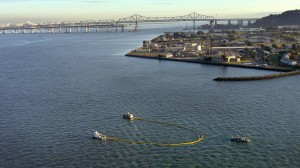The arrangement has dragged on so long that the electrical infrastructure is wearing out, subjecting residents of adjacent Treasure and Yerba Buena islands to nearly 40 outages this year.
Now, Yerba Buena Island tenants face a Dec. 31 deadline to choose apartments elsewhere on the island to make way for a proposed 2014 groundbreaking of the first phase of the 8,000-unit mixed-use development.
The city is a partner in the site’s redevelopment, and local officials hope to use Mayor Ed Lee’s star power as San Francisco’s first Asian American mayor to help woo Chinese officials into approving a $1.7 billion loan.
But Lee canceled a November trip to China, blaming the delay on the recent ascension of former Chinese Vice President Xi Jinping, who became general secretary of the Communist Party.
“Making big decisions on the financing at a time when there was a change in leadership in China could have introduced uncertainty,” Lee told The Bay Citizen. “We just want to be sure we’re in good standing and hope that the funding remains a priority.”
The mayor’s office referred questions about loan details to Lennar Corp., which is leading the development consortium. But when asked about terms, status and backup financing, a Lennar spokesman offered no comment. Previously, reports have linked the deal to a development contract with the China Railway Construction Corp.
At last week’s meeting, Yerba Buena Island residents were less concerned about international financing than more personal concerns: crime rates on neighboring Treasure Island and whether replacement units there measure up to their current duplexes. Some expressed concern that they would be moving into a radioactive waste cleanup site.
Longtime renters at Yerba Buena Island, where former Navy family housing rents for upward of $1,813 per unit, have been offered the option of apartments of similar size and value at Treasure Island. There, they’ve been promised a version of rent control, where rates will rise at a fraction of inflation. Rental benefits also will apply to housing in the new development.
Those who opt not to move to Treasure Island are eligible for a $5,000 opt-out premium.
Twelve-year Yerba Buena Island resident Ken Masters said he doesn’t trust Navy officials’ reassurances that radioactive waste on Treasure Island poses no public health threat.
“They’re saying, ‘Just take our word for it; it’s safe,’ ” Masters said. “Never mind the radioactive signs. Never mind the guys in the decontamination suits doing soil tests. Never mind that you can’t eat a vegetable out of your garden. You’re safe.”
Masters is a plaintiff in a lawsuit alleging that the development’s environmental review was inadequate. A judge is expected to rule this month on whether the Navy accurately documented toxic and radioactive waste on the island.
“We are confident that our case is solid and that the court system will recognize the environmental flaws in the project,” said former San Francisco Board of Supervisors President Aaron Peskin, a co-plaintiff.
At last week’s meeting, Tymoff expressed equal certainty, saying the environmental review was complete and predicting San Francisco would overcome the legal challenge.
This story was produced by The Bay Citizen, a project of the Center for Investigative Reporting. Learn more at www.baycitizen.org.
 After a decade of delays, San Francisco is taking concrete steps toward turning the former sandbar known as Treasure Island into a $1.5 billion condominium community.
After a decade of delays, San Francisco is taking concrete steps toward turning the former sandbar known as Treasure Island into a $1.5 billion condominium community.
